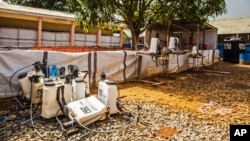Ebola survivors in Sierra Leone are helping to train health care workers by showing them what to expect when dealing with Ebola patients. The training is a partnership between the International Organization for Migration (IOM), the World Health Organization and the Sierra Leone Ministry of Health and Sanitation.
The training takes place in a stadium downtown. A mock hospital has been set up so people get a real sense of being at work
Some Ebola survivors find great comfort in a song they wrote thanking God they are still alive. They sing it when they meet for a panel discussion with health care workers going through training.
Marina Sheriff is one of those people. She caught Ebola from a local doctor.
Speaking in her native Krio language, she said, "I want to make people know Ebola is real, because when it started, people were in denial about it, they did not believe it existed."
Vital preparations
But it does exist. That is why it is so important for health care workers to be prepared, said Yasmin Kandeh, a training superviser with IOM.
She said it is crucial for workers to know how to properly put on and take off their protective gear. The virus is spread through contact with an infected person's bodily fluids, and patients often experience vomiting and diarrhea, so the slightest slipup can turn health workers into patients themselves.
The workers are also taught what behavior to expect from Ebola patients, said Kandeh. "Patients who are delirious and confused, these are some of the major challenges that pop up in the Ebola treatment units, and we just want to prepare the health care workers to be able to manage such challenges efficiently and compassionately."
Diana Garde, a certified nurse and midwife from Seattle, went through the training.
The mock treatment center offered helpful training scenarios, she said. One had needles scattered on the ground. The trainer "would say, ‘You need to be looking at everything when you walk in,'" including the ground, Garde said. That helped because "when things get really busy and things fall on the ground and you’re wearing PPE [personal protective equipment], you can’t see all around you. Your sight is limited."
Inspiring scenes
Garde added that as challenging and busy as her time has been, it will be hard to leave, especially as she has been able to witness people overcome Ebola.
"We have had people we thought were not going to make it and they have walked out on their own two feet, so we have had some incredible success," Garde said. "And sometimes women will come back and visit us and that is always a really good feeling."
The training can also be helpful to Ebola survivors themselves, as many face stigma and are shunned.
Survivor Fonti Kargbo caught Ebola from his wife. She did not survive and neither did his children. Now he is completely alone. He said doing something positive – coming every day to train health care workers – helps keep him going.
"Since I started coming here, at least by interacting, talking about my own story, it makes me forget a little, but it is not easy,” Kargbo stated.
The training with Ebola survivors began last November. Similar training is occurring in Liberia and Guinea, the other countries heavily affected by the disease.




